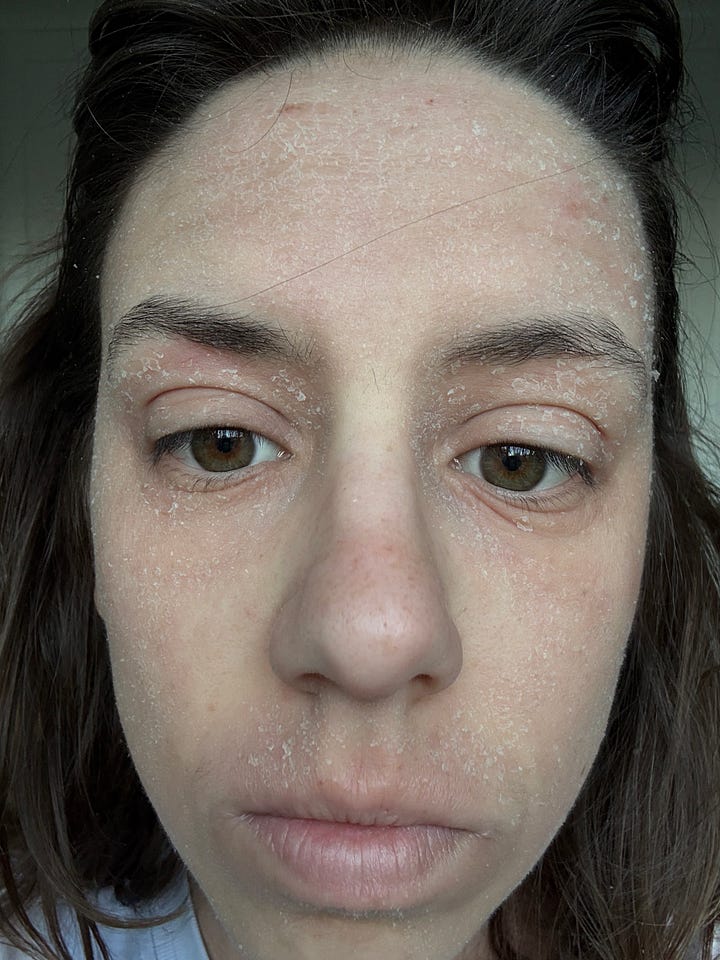Practicing Gratitude Amidst the Hardships
It's possible to be grateful and angry at the same time.
Hi friends, I’m writing to you with good news—my skin is clearer and my energy brighter than it has been since September. If you don’t know, I’ve been struggling with chronic, debilitating eczema for the past five or so months, and it has gotten worse and worse. That’s not what this post is about, but it’s relevant to the topic at hand: being grateful, sad, tired, and angry all at the same time.


It’s hard to put into words how frustrating it’s been to deal with this latest bout of chronic illness after I thought I put my eczema to bed in 2018ish and Crohn’s into remission in 2021. I got used to being healthy the past couple of years. And within my relatively healthy body, I was able to do a LOT of trauma and grief processing. I also got a lot of work done, a lot of posts made, programs created, clients served, and blogs written. By the end of 2023, I felt immensely grateful for the progress and happiness I had achieved. Safe to say, gratitude is a lot easier when things are going well.
As my skin and health seemed to slowly deteriorate for seemingly no reason over the course of 2024, followed by the election in November, gratitude became a lot harder to access. It also began to feel like an essential lifeline.
By January, I felt like I needed a gratitude practice to keep me tethered to hope and sanity. If you’ve struggled with chronic illness I’m sure you’ll get it. Losing control over your health, with no idea how or if you can make it better, is horrific. For a trauma survivor who has traditionally coped with life by seeking control over what I can control (myself), losing control over such a huge aspect of my life has been profoundly stressful and filled with despair. It’s so hard to get worse and worse and worse, to begin to lose touch with the moments you still had hope. To give up exercise, and all fabric except cotton, and good sleep, and feeling the energy for so much of my work. It’s hard to lose so much that helped you feel alive.

So at the start of the new year, I decided to do my best to notice one good thing a day. My biggest goal for this year was to love life again, and it felt like finding something to be grateful for each day was a solid step towards that. Some days the good thing was walking my dog. Some days it was having a delicious coffee. Some days it was crocheting and watching Love Island. Some days it was laughter with my friends. And none of it took my eczema away. Gratitude didn’t get rid of my pain. But if offered me something else to focus on, if even for a moment. It offered me glimmers of joy that reminded me why life is worth living.
So as I sit here, on the precarious edge of 5 days on a new medication (Protopic) that is working like magic so far, 5 days of low to no itching, 5 days of my energy and capacity slowly returning to me after months of brain fog and fatigue and burning and cracking and NEAR-CONSTANT ITCHING, the gratitude feels bright and accessible. To the point that I’m here, sharing these reminders with you:
You’re allowed to be grateful for the good things that have happened while also grieving all the horrors you’ve endured.
You’re allowed to be grateful for what you have, and tremendously angry for what you’ve lost.
You’re allowed to be grateful for the world, and also hate the world, at the same damn time.
As a trauma survivor, I know that a gratitude practice can feel either nourishing, gaslighting, or somewhere in the middle.
Sometimes gratitude feels like a lifeline when I’m drowning in despair. It reminds me of the good things worth living for.
Sometimes gratitude feels like a way of bypassing my pain. Being told to “be grateful it’s over” or “be grateful; it could’ve been worse” takes away from my ability to honor the pain of my experience.
Like forgiveness, I believe gratitude should be a personal choice. As in, let’s stop telling people to “just be grateful” as if that can erase the realities of living with trauma or chronic illness or ongoing discrimination and oppression in the world we live in.
Gratitude is your choice, and there is no moral imperative to practice it. And - it’s helped me through a really, really rough time.
Let me know your thoughts on gratitude in the comments!
And if you’re looking for some trauma-informed support right now because life is hard and no one’s meant to hold it all on their own, I’d love to work with you.
Learn more about my trauma-informed, somatic coaching work here.
With care always,
Emmy





I'm glad to hear you've found a new medication that's helping. I've noticed winter retriggers a lot of stuff for us folks with chronic conditions.
But this newsletter is very timely, since I've been struggling with how to exercise gratitude during these times and published a newsletter on the topic right before I read your post (which I really appreciated). Gratitude often helps, but it's also often not accessible to us, and that's okay too.
https://indeeptime.substack.com/p/a-game-from-katniss-everdeen-to-help